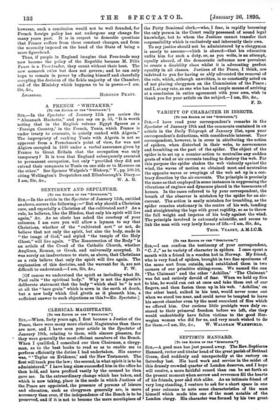CLERICAL MAGISTRATES.
[To THE EDITOR 01 THE " SPECTATOR."]
Six, When, forty years ago, I first became a Justice of the Peace, there were many more clerical Magistrates than there are now, and I have seen your article in the Spectator of January l9th, relating to them, with sincere pleasure, for they were generally the most efficient members of the Bench. When I qualified, I consulted our then Chairman, a clergy- man, as to the best books to read so as to enable me to perform efficiently the duties I had undertaken. His answer was, " Taylor on Evidence,' and the New Testament. The first will teach you the law ; the second, in what spirit it is to be administered." I have long since succeeded him in the office he then held, and have profited vastly by the counsel he then gave me. In the extraordinary change which has taken, and which is now taking, place in the mode in which Justices of the Peace are appointed, the presence of persons of leisure and education, such as clergymen generally are, is more necessary than ever, if the independence of the Bench is to be preserved, and if it is not to become the mere mouthpiece of the Petty Sessional clerk,—who, I fear, is rapidly becoming the only person in the Court really possessed of sound legal knowledge, but to whom the Justices cannot transfer that responsibility which is exclusively and inherently their own.
To say justice should not be administered by a clergyman is surely to assume—which is absurd—that his education unfits him for such a duty, or, as you write, is an attempt,. equally absurd, of the democratic influence now prevalent to create a disability class whilst it is advocating perfect equality in all classes. Justices of the Peace, I think, are- indebted to you for having so ably advocated the removal of the rule, which, although unwritten, is so constantly acted on of not placing clergymen on the Commission of the Peace ; and I, at any rate, as one who has had ample means of arriving at a conclusion in entire agreement with your own, wish to thank you for your article on the subject.—I am, Sir, &c., F. D.


















































 Previous page
Previous page